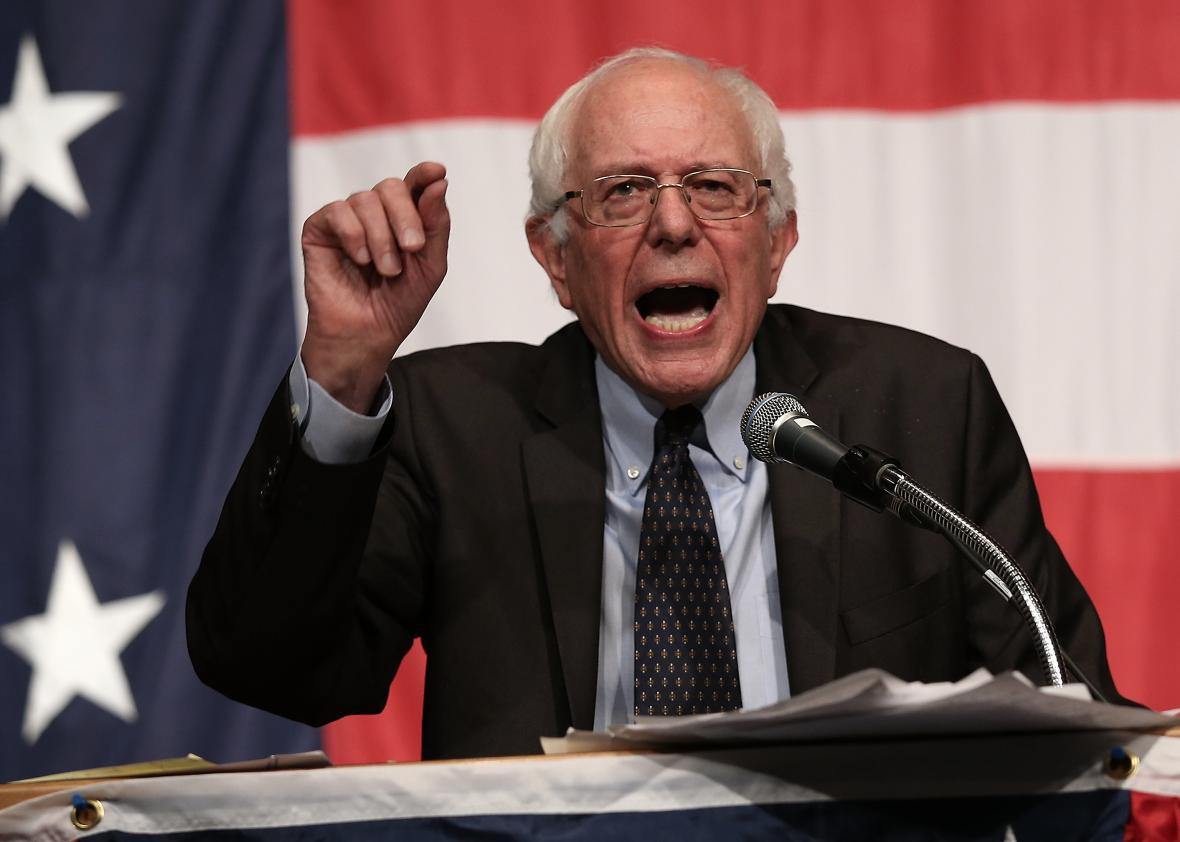Vermont Sen. Bernie Sanders likes to describe himself as a longtime supporter of marriage equality—in sharp contrast to his Democratic rival Hillary Clinton, who’s still striving to convince her base that she’s on board with LGBT rights. In May, Sanders famously told New York Times columnist Gail Collins that “I’m not evolving when it comes to gay rights. I was there!” Liberal outlets consistently describe Sanders as a pioneer for marriage equality. As proof of his pro-LGBT credentials, Sanders frequently touts his opposition in 1996 to the Defense of Marriage Act, which barred the federal government from recognizing same-sex marriages.
But Sanders is not quite the gay rights visionary his defenders would like us to believe. Sanders did oppose DOMA—but purely on states’ rights grounds. And as recently as 2006, Sanders opposed marriage equality for his adopted home state of Vermont. The senator may have evolved earlier than his primary opponents. But the fact remains that, in the critical early days of the modern marriage equality movement, Sanders was neutral at best and hostile at worst.
Like his current Senate colleague Sherrod Brown, D-Ohio, Sanders deserves credit for opposing DOMA—then a popular measure with bipartisan support—while a member of the House of Representatives in 1996. But Sanders’ efforts to parlay this vote into indisputable proof of his marriage equality bona fides ring hollow in light of his statements at the time. Explaining his vote in 1996, Sanders’ chief of staff told the Rutland Herald that Sanders’ vote was motivated by a concern for states’ rights, not equality. Explaining that he wasn’t “legislating values,” she noted that Sanders believed DOMA violated the Constitution’s Full Faith and Credit Clause by allowing one state to refuse to recognize a same-sex marriage performed in another. “You’re opening up Pandora’s box here,” she said told the Burlington Free Press at the time. “You’re saying that any state can refuse to … recognize the laws of another state if they don’t like them.”
Perhaps Sanders’ team used this states’ rights rationale to limit backlash from anti-gay voters. That would be a perfectly acceptable tactic, since his vote—not his explanation of it—is what matters most. Still, if that’s the case, then Sanders should be honest about it. Sanders’ rhetoric leads listeners to believe that the congressman championed gay rights and rebuked Congress’ homophobia during the DOMA debate. But in his statements to the press at the time, Sanders defended states’ rights and made no mention of gay Americans’ dignity. His vote may have been brave. But it was hardly a full-throated cry for equality.
Ten years later, Sanders took a similarly cautious approach to same-sex marriage. In 2006, he took a stand against same-sex marriage in Vermont, stating that he instead endorsed civil unions. Sanders told the Associated Press that he was “comfortable” with civil unions, not full marriage equality. (To justify his stance, Sanders complained that a battle for same-sex marriage would be too “divisive.”) At the time, he also opposed a federal anti-gay-marriage amendment—but so did his Republican opponent for the Senate seat, Richard Tarrant, who also supported civil unions. With a wide lead in the polls and little at stake, Sanders declined to differentiate himself from his opponent by taking the lead on gay rights.
Earlier in his political career, Sanders was even more indifferent toward gay rights, which W.J. Conroy recounts in his book Challenging the Boundaries of Reform: Socialism in Burlington. When serving as mayor of Burlington, Sanders told an interviewer that LGBT rights were not a “major priority” for him. Asked if he would support a bill to protect gays from job discrimination, Sanders responded, “probably not.” That was more than 25 years ago. Sanders has, no doubt, come a long way since then: The senator endorsed Vermont’s successful Marriage Equality Act in 2009 and has cheered the Supreme Court’s marriage rulings. And he is co-sponsoring the Equality Act, a sweeping federal LGBT rights bill that advocacy groups place high on their post-marriage agenda.
Still, Sanders’ exaggeration of his marriage equality record is strange and unwise. If Sanders were honest about his evolution—and, yes, it was an evolution—then he could still brag about supporting marriage equality long before his chief primary rival. Instead, he has attempted to reframe his somewhat tepid support as vociferous and unabating. The LGBTQ community can surely forgive Sanders’ less-than-spotless record on gay rights—but that process can only begin once he’s honest about it. And in the Democratic candidates’ race to secure the gay community’s vote, honesty has been in surprisingly short supply.
Update, Feb. 9, 2016: This post has been updated to clarify the sources of several quotes.
